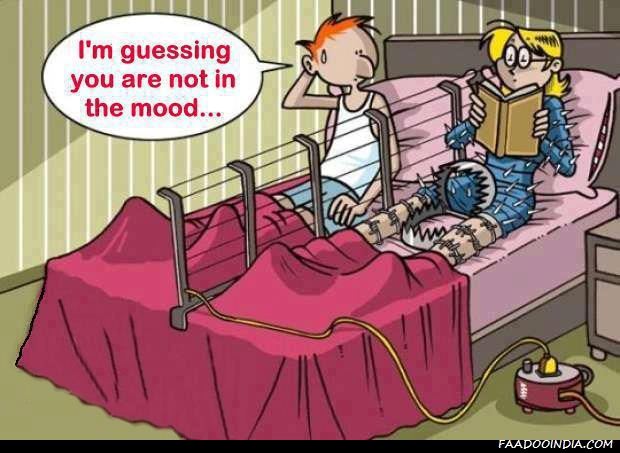 http://faadooindia.com/2012/07/im-guessing-you-are-not-in-the-mood/Read the cartoon. “I’m guessing you are not in the mood…” Cue laughter.
http://faadooindia.com/2012/07/im-guessing-you-are-not-in-the-mood/Read the cartoon. “I’m guessing you are not in the mood…” Cue laughter.
Why does this evoke laughter? Even I laughed initially when I read it before I considered other perspectives. I was curious whether women in general would find it amusing due to familiarity with that situation, or if they would be upset by it. And what about men?
In my private practice, I frequently witness this dynamic with couples of mismatched desire levels, albeit not to the extent of barbed wire. In bed at night, here’s the monologue that seems to go through the woman’s head:
He will probably want sex tonight. It’s been a little while so maybe I should. But I’m exhausted and don’t feel like it. If I yawn loudly, he’ll see the subtle clue that I’m too tired and not ask, and then I won’t feel guilty about saying no.
This cartoon cuts through the mental game playing as the woman blatantly presents her opinion about sex that night. The man scratches his head, and with a bit of uncertainty, states the obvious.
I’m mixed about how I feel about a cartoon like this. This is a stereotype, and such stereotypes are problematic because they can enforce already restrictive gender roles. On the other hand, this is how many couples operate, and humor is a known path to opening dialogue around uncomfortable topics.
So I posted the cartoon on Facebook and asked for people’s initial reactions, and why they had that reaction (both publicly and in private message). The responses were incredibly varied from the extremes of “this is depressing” and “this isn’t funny,” to recognition that “as a mother of three children, I laughed,” to “lighten up people, it’s a joke” (which incidentally, was from a man). The most poignant responses were those indicating opposing gender perspectives on who was responsible for the couple reaching this point. As one friend posted, we need to ask why this is happening. I quite agree. What differences are women and men learning about sex and experiencing around sex that makes this a national joke? Clearly we’re missing the mark, and each other.
From a woman’s perspective, why would she get to a point of desiring physical barriers between her and her partner? She may be exhausted and overwhelmed from juggling so much, doesn’t feel much of a physical sex drive, she’s bored with the same old in the bedroom, or she’s built up a wall of resentments that make opening up sexually difficult. These are all common explanations I hear from clients and quite valid. The Facebook crowd added that a discomfort can exist if the man has cheated or if the woman gets tired of saying no. This was exemplified by the comment, “another clueless horny man,” from a woman who thought the cartoon was funny because it’s true. There were also some women who felt that the depicted couple was sad and distressing, because clearly her other modes of communication had been ignored.
The sad theme was also mentioned by several men, who saw it as frustrating to a man. I perceived these responses to mean that to encounter such roadblocks when desiring sexual intimacy with your partner is upsetting. Continual rejection can take quite a toll on a man’s self-esteem and confidence. On the other hand, several men found humor in the cartoon with the “it’s funny because it’s true” response for a few reasons: because women don’t communicate directly enough for men to understand, so the blatancy of the cartoon is appreciated; it “blames” the woman for her lack of interest in sex; and that the use of a bear trap and fencing in bed is just funny. As to why a man could get to this point in a relationship, in my practice, I’ve found that men are more likely to continue to have physical sexual desire throughout a long-term relationship, while their female partners don’t experience the same type of physical urges. It can be difficult for men to understand and accept this shift.
That being said, I would be remiss to not share the perspectives of the women and men who expressed the opposite view. A couple women were in the shoes of the “man” of wanting more sex. One man responded, after a chuckle, that sometimes guys don’t want sex either. There were also some people who recognized that it takes two to tango, and both partner’s played a main role in creating this sad situation. I certainly see all of this in my practice as well.
What is the lesson here? In relationships as depicted in the cartoon, it’s vital to realize that the woman is not trying to be a gatekeeper. Additionally, the man is not trying to be an ass. Despite the difficulty in each partner accepting this, it is actually quite hurtful and guilt-inducing on both sides. Drop the defensiveness and get to the vulnerable truth, and allow space for your partner to do the same. Get to the heart of your needs, desires, and motivations, and open to a teamwork approach. Otherwise that electrical fence will get more charged and divisive.
And the funniest response on Facebook? One of the class clowns from my high school did not disappoint. He wrote: “I’m wondering what book she’s reading? Maybe it’s 50 Shades of Grey, in which case the guy should hang in there as she might change her mind shortly.” Thank you, Doug.
~Dr. Jenn Gunsaullus, San Diego, CA -- Sex Therapist, Sexuality Speaker, Sexologist














































